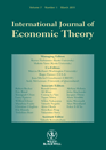 Authors: Andrea Galeotti and Fernando Vega-Redondo
Authors: Andrea Galeotti and Fernando Vega-RedondoTitle: Complex networks and local externalities: A strategic approach
Source: International Journal of Economic Theory
Abstract: In this paper, we illustrate a new approach to the study of how local externalities shape agents' strategic behavior when the underlying network is volatile and complex. We consider a large population that interacts as specified by a random network with a given degree distribution. Motivated by the complexity of the induced network, we assume that the only precise information agents have is local; that is, it is restricted to their immediate neighborhood. Each agent chooses an investment level, which, in turn, imposes a payoff externality on his or her neighbors that is captured by a (local) Cobb-Douglas production/payoff function. We find that, in the unique interior equilibrium, the induced externality is positive or negative, depending on whether investment costs are, respectively, above or below a certain threshold. This also has implications for the nature of the equilibrium strategy, which is increasing in the degree, in the first case, and decreasing in the second. Finally, we also characterize how the equilibrium changes when the network topology varies and becomes more connected, or when its degree distribution becomes more polarized.
Further articles






